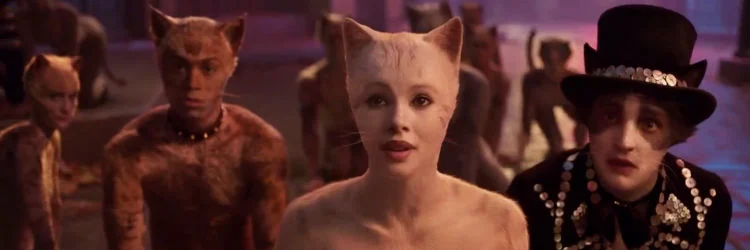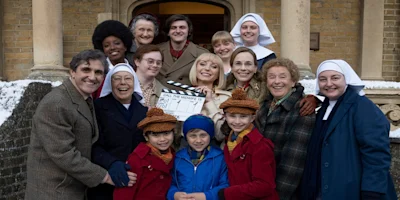
The latest Cats film: Is it the cat's whiskers or just a moggy?
Cats are famously said to have nine lives; but has the eponymous musical just used one of them up on the critically lambasted film version that opened just before Christmas?
The original musical, of course, became the longest-running musical in the history of the West End until then during its original run at the then-named New London Theatre (now renamed the Gillian Lynne, in honour of the show's late choreographer, who passed away just over a week after attending the theatre's renaming ceremony in 2018), before it finally closed on its 21st birthday on 11th May 2002 (since eclipsed by Les Miserables). It also set the Broadway record for long-runners, too, during its original New York run of 18 years (since eclipsed by Lloyd Webber's The Phantom of the Opera).
But that success was never expected, let alone assured: as Lloyd Webber remembered in an interview in 2014 in the Daily Telegraph, "Everybody in the West End thought we were completely and utterly crazy. The moment that Cats came on stage could have been one of the most ridiculed moments in the history of theatre."
He and his co-producer Cameron Mackintosh (working together for the first time, but not the last) even struggled to raise the capitalisation to finance it. When Lloyd Webber approached the film studio Warner Bros, he told them, "Fifty per cent of the world loves cats and the other half of the world hates them and I'm very happy to only play to fifty per cent of the world." They were unconvinced, and Lloyd Webber himself took out a second mortgage to contribute towards the £450,000 production costs.
But the subject matter was not the only concern. As Cameron Mackintosh recalled in a 2016 interview in the Financial Times, it was a big risk. "The idea of the British doing any musical was fairly risible but doing a dance musical was considered total lunacy. Only Americans did that."
As I wrote in my own review of the show's first London revival at the London Palladium in 2015, "It still offers its audiences (and the musical theatre itself) a jolt of innovation and inventiveness that the British musical has seldom achieved before, and 34 years since its opening, remains both radical and surprising. No dance-based musical like it had ever been attempted before in the UK; six years after A Chorus Line had put Broadway dancers' lives onstage, we replied by putting the lives of cats onstage, and getting expertly athletic dancers to play them."
So the apparent lunacy of the idea paid off - literally and handsomely. As reported by none other than the Financial Times, "the 240 investors in the original London production received £26.8m over its 21-year run, a 60-fold return."
Yet there is still something surprising, not just in that statistic, but in the fact that it was embraced so thoroughly by its audiences, and not just in London and on Broadway, but in the first example of a musical that became globally franchised, in productions from Amsterdam to Tokyo, Sydney to Switzerland. It led to a "musical boom" in Germany that saw the building of bespoke theatres in Hamburg and Bochum to house productions of Cats and other Lloyd Webber properties like Starlight Express (still running continuously since 1988) and The Phantom of the Opera.
Again, the Financial Times correctly characterise the musical revolution that Cats initiated: "It was global in a way that musicals about the American dream and American guys and dolls were not. Without planning to, Lloyd Webber and Mackintosh had created a show that translated everywhere. The fact that Cats was so unlike conventional musicals produced a further unanticipated benefit — theatres in other countries did not even try to mount their own versions. They asked for the original." (As Mackintosh put it, "What used to happen was you'd send them the script and if they paid £3,000 you'd give them the grand plans of the set and they'd do their own version. This time, they were saying, 'We'd like to do Cats in Vienna or Cats in Norway but we want your production.'"
But if the show was a global hit, it also, unsurprisingly, provoked something of a cultural backlash. My favourite was in John Guare's 1990 Broadway play Six Degrees of Separation in which a married couple of cultured New Yorkers discuss the show in these terms: "You said it was an all-time low in a lifetime of theatregoing. You said Aeschylus did not invent theatre to have it end up a bunch of chorus kids wondering which of them will go to kitty-cat heaven."
That snobbery persisted to when the 2015 West End revival went back to Broadway in 2016. In Time Out New York, David Cote admitted a note of personal history that honestly underlined his own reflective disdain for it, saying: "My gateway show was not Cats—nor was it Les Miz or Phantom. I grew up, like any self-respecting theater snob, disdaining such tourist trash from afar. Lacking youthful nostalgia for Andrew Lloyd Webber's synth-heavy score and the trademark image of actors writhing about in leg warmers, hissing through face paint, I've now seen the real thing live and up close. It blew my mind a little—like experiencing someone else's déjà vu. Mainly I'm shocked that this ran from Reagan to Clinton. Most 12-year-olds have terrible taste; you can't blame them, they're only kids. They probably didn't say to themselves: This show is amazing, but is it any good?"
And he replies to his own question, "Tough question. When Cats opened at the Winter Garden in 1982, it was an incredibly risky experiment. T.S. Eliot's 1939 book of children's poetry, Old Possum's Book of Practical Cats, set to Britpop, sub-Puccini and English music-hall melodies. Actor-dancers poured into skin-tight unitards (well, that one's a no-brainer). The whole thing whipped to a frenzy in Trevor Nunn's music-video staging, perhaps cribbed from a Las Vegas discotheque. The first producers must have had screaming nightmares of bankruptcy. Today, Cats feels experimental only in the sense of writing a show as if Oklahoma! and Company never happened."
Cote's sense of historical perspective in analysing his own response to the show is welcome, and it's a framework that the film critics who reviewed the new film version mostly lack. Yes, of course, they could do the snark on demand: The Guardian's Peter Bradshaw excelled himself with a review written entirely like it was a TS Eliot poem (and borrowing liberally from The Naming of Cats in form and words), of which the following is but a sample:
"Each male in the cast looks a bit of a bellend,
And those bizarre whiskers don't add to their charms.
The Jellicles welcome Victoria: a new cat,
Francesca Hayward's the thesp with this role,
She's sleek, unlike Corden - well known for TV chat
But it's his size that reveals that he's meant to be droll.
And then Idris Elba comes on as McCavity,
(A boomy-voiced villain in anyone's book)
There's a prominent gap in his penis locality.
I honestly didn't ... well ... know where to look.
As Grizabella, Jennifer Hudson will sniffle
Singing Memory, this movie's moment of truth.
But it's warbling warbling warbling piffle
From a bag lady drama-queen obsessed with lost youth."
The bizarre but brilliant theatrical concept behind Cats - which in the theatre passes muster, because the theatre is all about creating an alternative reality that we happily engage with - becomes in the film, according to the Evening Standard's David Sexton, a case of "redoubling the absurdity". He complains, "Notwithstanding the raggedy costumes, the stage show always had the warmth of human presence (not to mention startling anatomical explicitness), heightened by the immersive staging. Such heavy CGI tinkering takes that all away. Yet these cats are never even momentarily plausible as cats either, obviously. Rather they seem to be grotesquely deformed human beings. There are moments when this film seems not so much an adaptation of a nonsense classic as a horror story, nearly as obscene as The Human Centipede."
But it is his conclusion that is the biggest - and most revealing - sneer of all. "Perhaps musical fans will love it anyway? Perhaps. They are one of the permanent mysteries of life." By casually dismissing an entire segment of the public whom it might appeal to, he's truly nailed his colours and prejudices to the mast.
As one of those mysterious musical fans myself, I actually had a good time watching it. As I tweeted after seeing it: "Just caught Cats, & no, it's not the catastrophe that (most) movie critics seem to have delighted in taking down. Sure, it was always an eccentric stage show; but its joy was its playful silliness & gorgeous tunefulness. Both are still intact here. So are some great cameos."
And already the film's critical rehabilitation is duly afoot. The Guardian sent their dance and new theatre critic to see it, with the former, Lyndsey Winship, perceptively writing, "Perhaps Cats just didn't click with film critics because it's a show in love with the myths and magic of theatre: the velvet drapes and faded glamour, the names in lights, the stars and the gutter; the band of misfits united in pursuit of the perfect number; the spotlight as saviour. And then there's the most essential theatrical element of all: suspension of disbelief." Arifa Akbar, who has just taken over this year as chief theatre critic, also declared, "The film encapsulates a genuine sense of theatre. In fact, Cats feels like a production for the stage rather than the screen and may appeal most to those who love live performance... Children - for whom the original book was intended - are likely to delight in the film's oddness. They will love the costumes and tensile tails that rise up in perky moments (which some adults have been quick to describe as obscene). Films that bomb as spectacularly as this one always have the prospect of a cult revival, critical rehabilitation, and second life. For a cat movie, with its potential for nine, that would be the perfect ending."
Originally published on









